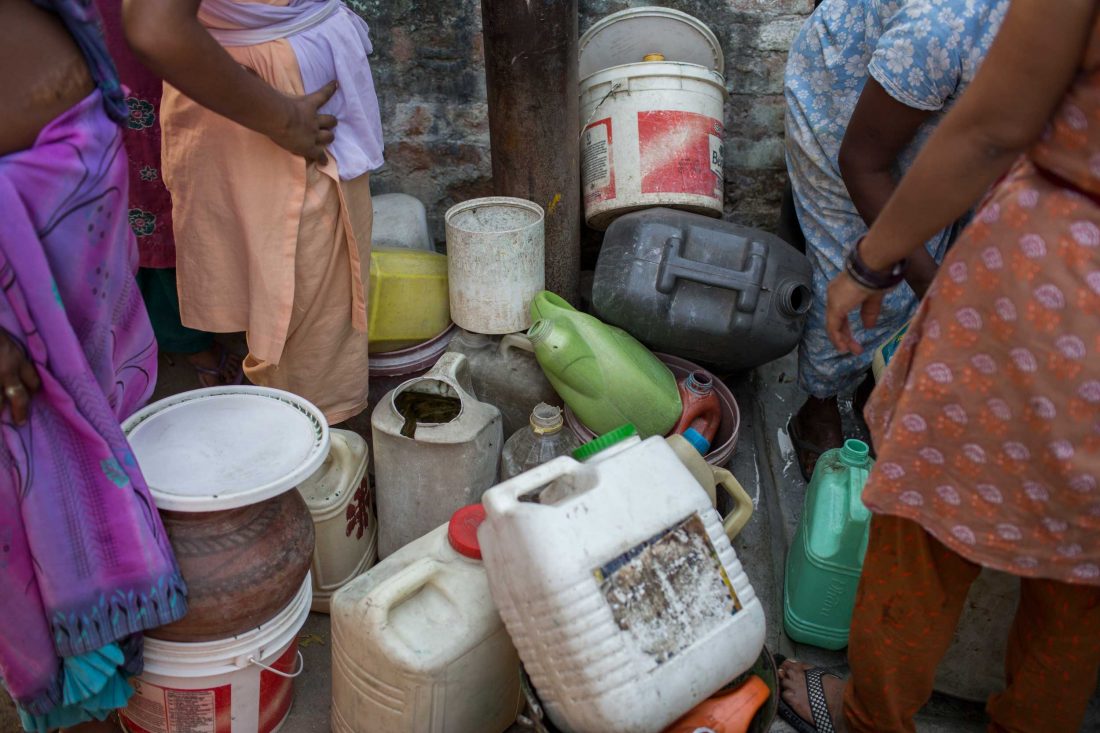Last week, widespread mob violence broke out in India’s high-tech capital, Bangalore, over a Supreme Court order that requires the state of Karnataka to release 15,000 cubic feet of water per second per day from the Cauvery river to the neighboring state of Tamil Nadu. The violence, which left two dead and hundreds arrested, stems from a decades-long sore point in relations between the two states over river water sharing.
Such disputes are becoming all too common in India and across Asia where drought, weak monsoons, and poor management of domestic water sources have resulted in a water crisis situation in many states. The region’s rivers are under increasing stress from over-use, pollution, and climate change-induced natural disasters. This past summer, parts of the west and central areas of India witnessed one of the most prolonged and punishing droughts in history when temperatures soared to 51 degrees Celsius. The situation was so dire that the state of Maharashtra was forced to send a “water train” to parts of the state where wells and other water sources had run dry.
Over-extraction of ground water is of particular concern in South Asia—where an estimated 23 million pumps are in use across Bangladesh, India, Nepal, and Pakistan—and is having a tremendous impact on the environment, biodiversity, and human health. It is estimated that salinity and arsenic have contaminated more than 60 percent of groundwater in the Indo-Gangetic plain. The results of this rapacious use of water resources are increasingly evident in Asia’s growing cities and towns where water scarcity has in many instances resulted in conflict.
From September 12–14, members of civil society organizations, government, policymakers, the media, private sector, and the international development community convened in New Delhi for the annual 19th International River Symposium (IRS), to examine the growing global water security challenges and to draw attention to specific concerns on the management of river basins in South Asia.
The Asia Foundation hosted a special session at the symposium on the role of civil society engagement in transboundary water management. The session brought together a panel of civil society experts and practitioners from South and South East Asia to discuss the role that civil society can play in influencing policy processes at the local, national, and transboundary levels for improved management of water resources.
In their opening remarks, panelists Ajaya Dixit, president of ISET-Nepal, and Uttam Kumar Sinha, a fellow at the Institute for Defence Studies and Analysis, emphasized the gradual broadening of space for civil society engagement in the sphere of transboundary water resources management. While water remains a politically contested issue in much of South Asia, there is growing recognition by governments of the need for constructive dialogue and engagement with civil society.
Anamika Baruah, associate professor, Indian Institute of Technology, illustrated this point by describing the constructive role that civil society has played in fostering and creating a regional forum for dialogue in the Brahmaputra Basin. In 2013, with the support of The Asia Foundation, Saciwaters, a consortia of civil society organizations, initiated the Brahmaputra Dialogue to bring together civil society, government, and policymakers from Bangladesh, Bhutan, China, and India to discuss common issues and challenges for co-management of the river basin and to develop an institutional framework for cooperation. Now in its third phase, the project is being supported by the World Bank’s South Asia Water Initiative.
Building on this, Socheata Sim, with Oxfam’s Mekong Regional Water Governance Program, brought a Mekong perspective to the discussion describing the role that Oxfam’s program has played in facilitating the engagement of farmers, fishermen, and women in dialogue processes in the Mekong river basin to ensure that there is greater inclusion of civil society and community voices in decision-making processes on water.
The session closed with a broad agreement that enhanced civil society engagement on water resources management at different levels—local, national, and regional—is critical to addressing water scarcity in Asia. There is growing evidence to suggest that civil society engagement is crucial to a more productive, collaborative, and constructive discussion on the issue of water security. At a national level, civil society organizations can serve as important conduits for fostering dialogue, highlighting critical issues around the environment, biodiversity, livelihoods and gender, and linking grassroots issues to national policy-making processes. At a transboundary level, through their ability to engage, network, and convene across borders, civil society organizations can engage with a range of stakeholders and foster dialogue processes that support and bolster formal negotiations.
In this way, civil society can serve to highlight critical issues on water security, foster collaborative relationships and partnerships that transcend borders, and in doing so, de-escalate tensions around regional cooperation on water.
Mandakini Devasher Surie is The Asia Foundation’s senior program officer in India, and tweets at @mdevasher. The views and opinions expressed here are those of the individual author and not those of The Asia Foundation or its funders.
Source: AsiaFoundation










